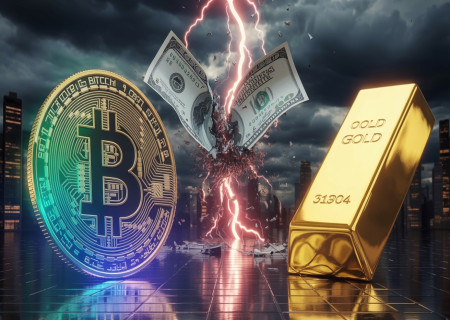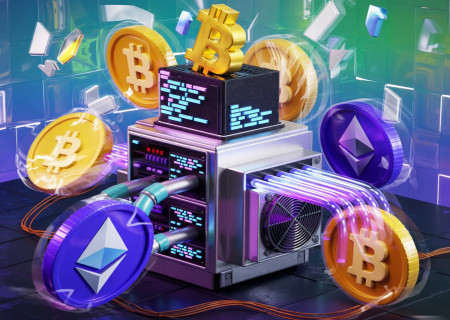
- June 3, 2025
- 8 months ago
Summary
Over the past few years, Bitcoin and gold have become significant assets in the financial system, with each having strengths and weaknesses. Gold has remained a safe vehicle of wealth, particularly during times of economic stress. Its physical form, limited supply, and worldwide acceptance ensure that it is a safe store of wealth. In the longer term, gold has proved to be a safe-haven asset during periods of financial crisis, inflation, and geopolitical tensions. It is not an income-generating asset, but a sure bet hedge against volatility in the market.
Bitcoin is a relatively recent, virtual currency that has become popular due to its potential as a new money. In contrast to gold, Bitcoin is not regulated by any institution or government, i.e., it is decentralized. It also has a finite supply of 21 million coins, thus introducing some form of scarcity, such as that of gold. Bitcoin is also less accessible than gold since it can be sent electronically around the world within seconds, thus perfect for individuals seeking rapid and inexpensive transactions. Its price volatility is a significant drawback, however, so it is not as secure as gold for long-term investment or daily use.
While Bitcoin is a good inflation hedge and store of value, its volatility and lack of use mean that it cannot be substituted for gold or fiat currency for daily use. Both gold and Bitcoin are good additions to an investment portfolio, and the most appropriate is based on how much risk one is willing to take and what goals one is trying to accomplish. As the financial world keeps on changing, the roles of these two assets will also be transformed, with each having a different function in defining the future of money.
Introduction
In the last few years, the financial world has seen more and more heated debates about the future of money, specifically the future of traditional assets like gold and new digital money like Bitcoin. With the evolving world economic conditions, particularly with concerns about the stability of the US dollar, the majority of investors and financial analysts are now questioning whether the current money system is as reliable as it used to seem. The idea of a "new money" system is now on the rise, with Bitcoin and gold often cited as the front-runners.
Gold has always been a safe-haven asset in times of economic instability. People want gold because it maintains its worth over millennia, a storehouse of wealth when paper money loses value. But Bitcoin, just more than a decade in existence, is being questioned on whether it can offer a new, decentralized type of money. Unlike gold, Bitcoin is not tied to any government or physical commodity, and it is rooted in a global digital network that enables quick, borderless transactions.
Today's volatility of the US dollar due to economic factors such as inflation, debt troubles, and political uncertainty has already caused individuals to turn their minds toward gold and Bitcoin as substitutes. While others find Bitcoin a likely alternative to gold as the new 21st-century digital "gold," Bitcoin's scarcity and distributional features make it a desirable asset to investors who wish to safeguard their assets in today's uncertain global financial environment.
But the gold vs. Bitcoin discussion isn't that simple. Bitcoin has quicker, more secure transactions and the potential for enormous returns, but it's volatile with price swings and unregulated. Gold is a well-tested asset that has endured the test of centuries, but it's only viable for physical transactions primarily, and also lacks the same growth as Bitcoin.
In this article, we’ll explore the growing speculation around the US dollar’s future, the arguments for both Bitcoin and gold as potential “new money,” and how these assets might shape the future of global finance.
Table of Contents:
- Is Bitcoin a Safe Haven Asset Like Gold?
- Can Bitcoin Replace Gold as a Hedge Against Inflation?
- Is Bitcoin's Limited Supply a Key Factor in Its Appeal?
- Does Bitcoin’s Volatility Undermine Its Role as ‘New Money’?
- Is Gold Still the Best Long-Term Investment Amid Economic Instability?
- How Does Bitcoin’s Digital Nature Change the Future of Money?
- Is a US Dollar Crash the Catalyst for a 'New Monetary System'?
- Is Bitcoin More Accessible Than Gold for Everyday Transactions?
- Conclusion
- Frequently Asked Questions (FAQ's)
Is Bitcoin a Safe Haven Asset Like Gold?
Bitcoin has also been compared to gold in the sense of being a "safe haven" asset, or an investment which holds its value during times of economic distress. Gold has remained a safe haven for millennia due to the fact that it does not lose value, especially when traditional currencies like the US dollar lose value. It's a physical asset too, so people can keep it in their possession.
Bitcoin, on the other hand, is a digital currency that operates much differently. Although it has gained broad acceptance as a store of value, it is much more volatile than gold. The price of Bitcoin can fluctuate wildly over the short term, so it is not as safe for some investors. Although Bitcoin is not controlled by a government and some see that as a plus, it can drop in value instantly on market speculation or government policy changes.
So is Bitcoin a gold-like safe-haven? It's not that certain. Though Bitcoin might make for an inflation or currency devaluation hedge, it's too unreliable to be a more stable commodity than gold, especially during uncertain times. Investors seeking safety hold on to gold, but others who are more eager to take a greater risk, anticipating a return, entice themselves with using Bitcoin as a modern substitute for past safe havens.
Can Bitcoin Replace Gold as a Hedge Against Inflation?
The idea of Bitcoin replacing gold as an inflation shield has been extremely popular among market participants in the last few years. Gold is traditionally a good place to put your money during inflationary environments, with its value rising when the purchasing power of traditional currencies like the US dollar falls. It's a physical asset that has been trusted for thousands of years and is thus the wisest vehicle to store wealth against inflation.
Bitcoin, however, is fairly new and works quite differently. Although equally thought of by some as an inflation hedge, it's a lot more volatile than gold. The value of Bitcoin can fluctuate within seconds, and its worth is vulnerable to market sentiment, regulation, and technology. All these render Bitcoin riskier than gold, especially for those looking for stability in times of economic downturn.
Despite all this, Bitcoin has some features that render it attractive as an inflation hedge. There is only 21 million coins that have ever existed, and this can assist in safeguarding against inflation due to over-money-printing. Some investors feel this scarcity makes Bitcoin less susceptible to inflation in the long term.
While Bitcoin does hold potential, it will not be taking over as a gold substitute for an inflation hedge in the near term. Gold enjoys centuries of stability and history to its name, while Bitcoin is still proving itself in the global financial system. But for some who are comfortable taking on higher risk, Bitcoin could be an addition to an existing portfolio already holding more conventional inflation hedges like gold.
Is Bitcoin's Limited Supply a Key Factor in Its Appeal?
Yes, the relative rarity of Bitcoin is probably one of the single most significant reasons that it is so much in demand. With fiat currency, governments can print money whenever they need to, whereas Bitcoin has a limited number of 21 million coins, and this scarcity is inherent in the system and makes Bitcoin appealing to most investors. The thinking is that since there is a limited supply of Bitcoin, it can't be "inflated" or devalued by producing more, as in the old money that loses value when too much is created.
This aspect of Bitcoin provides it with a sense of scarcity, like precious commodities such as gold, whose global supply is fixed.Everyone believes that this scarcity will be the one that keeps the value of Bitcoin constant in the long run, especially during periods of inflation or recession. As the demand for Bitcoin grows, its supply could be even more appealing to investors, and this could drive its value higher.
But bear in mind that although the scarcity of Bitcoin is a strong selling feature, it is an extremely volatile commodity and the price can change quickly based on the state of the market and other factors. So, though its scarcity is more desirable, it does not have promises of stability like more traditional assets.
Does Bitcoin’s Volatility Undermine Its Role as ‘New Money’?
Bitcoin's volatility does make it difficult to consider as "new money" in the traditional sense. Unlike regular currencies, which stay constant and are used in everyday transactions, Bitcoin's value can change dramatically over a short amount of time. For example, it can go up by thousands of dollars or down in a similar manner. This makes it less dependable for daily use since individuals would not wish to spend or receive something that would depreciate so fast.
Ideally, "new money" should be stable in order for individuals to spend it on goods, save, and invest in it without fear of astronomical price movements.The volatility of Bitcoin contradicts this idea as it's not simple to estimate what it will be worth the following day. Though others see it as a store of value or an investment, volatility makes it less convenient for everyday spending, which is one of the characteristic attributes of money.
Hence, wonderful as the prospect of Bitcoin is as an asset and store of value to hold, volatility still stands in the way of it being the sort of stable "new money" which will replace existing currencies in ordinary transactions.
Is Gold Still the Best Long-Term Investment Amid Economic Instability?
Gold has never been anything but one of the best long-term investments, particularly in times of economic uncertainty. Gold has preserved its value over thousands of years, and individuals will seek gold if they believe that common currencies, such as the US dollar, will depreciate due to inflation or economic downturns. In times of economic uncertainty, like inflation or political unrest, gold does not lose its value, but rather appreciates in value and thus serves as a haven for investors.
One of the most significant reasons why gold is a good long-term investment is that it is rare. Paper currency can be printed in unlimited amounts, but the amount of gold that exists is finite and keeps its value over the long term. In addition, gold is not tied to any nation or economy, so it is an international asset and can act as a stabilizer when other markets fail.
But even though gold is a real and solid asset, it still comes with its own set of problems. Gold won't make any interest or dividend payments as would the stocks and bonds, and sometimes the price of gold will be reactive to external forces such as central bank policy or movements in world demand. But notwithstanding all this, the majority of investors still retain gold in their portfolio, particularly for the preservation of wealth in an uncertain economy.
How Does Bitcoin’s Digital Nature Change the Future of Money?
Bitcoin's online existence can transform the future of money by redefining how we think about and use currency. Unlike government- and central bank-created fiat money, Bitcoin lives in a decentralized virtual space called the blockchain. That is, nobody like a government or a bank controls Bitcoin. Instead, it is held by a network of computers globally. This aspect of it makes Bitcoin usable everywhere in the world, where individuals can send and accept money affordably and at ease without the involvement of a third party, such as a bank.
The fact that Bitcoin is online also makes it a choice for faster, borderless payments. Since it is online, anyone can send Bitcoin to anyone, anywhere, at any time, as long as they have internet access. This would most probably make international payments easier since Bitcoin can cut out costly exchange rates or bank fees. Furthermore, Bitcoin payments are safer and clearer because every payment is documented on the blockchain, so it is more difficult to interfere with or modify.
Also, Bitcoin has a finite supply (there will be only 21 million coins) in comparison to fiat money, which can be printed ad infinitum. This scarcity could make Bitcoin a hedge against economic crisis and inflation and a way for people to store value regardless of the government.
Yet even so, however, Bitcoin still is not largely accepted as an instrument of daily trade and still is prone to price swings. People do not want to turn it into an everyday unit of exchange because it can move its value around too fast. Yet as the future develops and companies increasingly offer the option to accept Bitcoin as a form of payment, it will be more a mainstream challenger of traditional money.
Is a US Dollar Crash the Catalyst for a 'New Monetary System'?
A collapse in the US dollar is quite likely to be the precipitating event toward a 'new monetary system,' but there are no certainties. The dollar has served as the global reserve currency for years, and all international commerce and investments are measured in dollars.
In such a case, a US dollar collapse would open the doors to the development of a new monetary system with lesser reliance on the traditional fiat currencies. The system could be in terms of digital currencies, gold, or even an asset basket, as a means of securing money and facilitating cross-border trade without the menace of one strong currency. But if the dollar were to be severely devalued due to inflation, debt, or war fever, it would create a momentum for an alternative monetary system.
When the dollar is devalued, countries and investors can look towards other assets or currencies that will retain their value and facilitate cross-border trade. In such a situation, digital currencies such as Bitcoin or even a central bank-issued CBDC in a nation may be sought after as substitutes. Digital money, such as Bitcoin, being decentralized, has the benefit of being in short supply and deflationary, unlike the risk of governments simply printing more and weakening their currency.
Is Bitcoin More Accessible Than Gold for Everyday Transactions?
Indeed, Bitcoin is less accessible than gold for daily purchases, mainly because it is digital. Unlike gold, which is a physical good, Bitcoin is readily stored, transferred, and spent through electronic wallets on smartphones or computers. This makes it possible to transfer or receive instantaneously across borders without the shape of a physical transaction or the services of banks or other intermediaries.
All you require is an internet connection with Bitcoin, and anyone with a smartphone or computer can access it from anywhere in the world. Compared to that, the use of gold for daily transactions is cumbersome. It requires physical storage, i.e., a vault, and the process of selling gold for goods or services typically takes more steps, like finding a buyer or seller, and hence it is less convenient for use on a daily basis.
Bitcoin also enables small and large payments without any inconvenience. You can transfer a part of a Bitcoin, making microtransactions easy to do, which gold cannot do in the same way. For example, even if it's difficult to use a part of a gold bar for a simple purchase, you can simply transfer a tiny amount of Bitcoin to cover something online or offline.
Conclusion
In general, gold and Bitcoin share unique attributes as a means of value, yet they serve a unique purpose with unique benefits. Gold has existed as a value repository in periods of economic unpredictability because it has already had the ability to maintain value over centuries. Gold is a physical, tangible good that most folks trust as a value repository. However, it can be cumbersome to use in everyday transactions due to its physical nature and the complexities of selling, purchasing, and storing it.
Bitcoin offers a new-generation, digital alternative. Its ease of use and convenience of transfer make it a good contender for everyday transactions, especially in the current digital era, where people continue to insist on quicker and more efficient ways of handling money. The fact that Bitcoin is on a decentralized system and not being endlessly supplied renders it even more desirable as an investment that may protect against inflation and currency erosion. However, its volatility and relative unacceptability in the conventional market bar it from becoming an outright replacement for fiat money or even gold as the default commodity of the masses.
Ultimately, whether or not Bitcoin will replace gold depends on a range of variables, including how much more ubiquitous it becomes as a form of payment, how well it will stabilize in value, and how well accepted digital currencies become globally. While Bitcoin has potential, both as an inflation shield or as a store of value, it is yet to be fully ready to replace the use of gold in the traditional financial universe. Both Bitcoin and gold find a position in a diversified investment basket, and individuals can still utilize them for different purposes based on their risk appetite and investment goals. The future of money is still unwinding, and the evolution of these two instruments will play a significant part in defining it.
Frequently Asked Questions (FAQ's)
Que: Is Bitcoin a poorer investment than gold?
Ans: Gold and Bitcoin serve different purposes, so the answer will be based on what you need. Gold is a traditional, solid investment that has survived any form of economic unrest, especially economic uncertainty. Bitcoin is high-risk, high-return, but with enormous volatility. It's considered a riskier investment than gold, but some view it as a modern alternative that may protect against inflation.
Que: Why is Bitcoin a safe-haven asset like gold?
Ans: Some consider Bitcoin to be a safe-haven asset because its supply is capped (there will only ever be 21 million coins). That makes it resistant to being debased by inflation, just like gold. However, Bitcoin's volatility is extreme, so it's not as stable as gold, and it's still not widely accepted as a medium for everyday transactions.
Que: Is it possible for Bitcoin to replace gold as an inflation hedge?
Ans: While Bitcoin may one day be an effective hedge against inflation because of its rarity, its price has fluctuated vastly, and is hence not nearly as stable as gold. Some investors view Bitcoin as a newer inflation hedge, while others think that gold would be better in its longevity throughout history and consistency during harder times.
Que: Why is Bitcoin more convenient to use than gold for daily transactions?
Ans: Bitcoin is virtual and can be sent and received online easily, as a result of which it is simpler to utilize in day-to-day transactions. Bitcoin does not need physical handling and storage, and can be utilized globally without the use of middlemen like banks. The process of transactions in gold is more cumbersome and physically involves buying and selling, or finding buyers and sellers.
Que: Is Bitcoin a safe long-term investment?
Ans: Bitcoin can build a long-term investment strategy, but is riskier as it is price volatile. Much as its scarcity and potential to be used as a store of value draw it to some people, its unpredictable price volatility makes it riskier as an investment compared to gold, which is more conventional.




